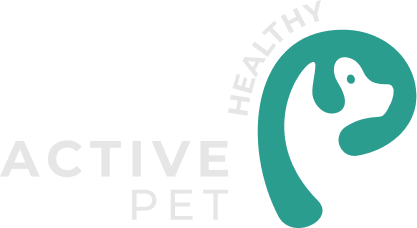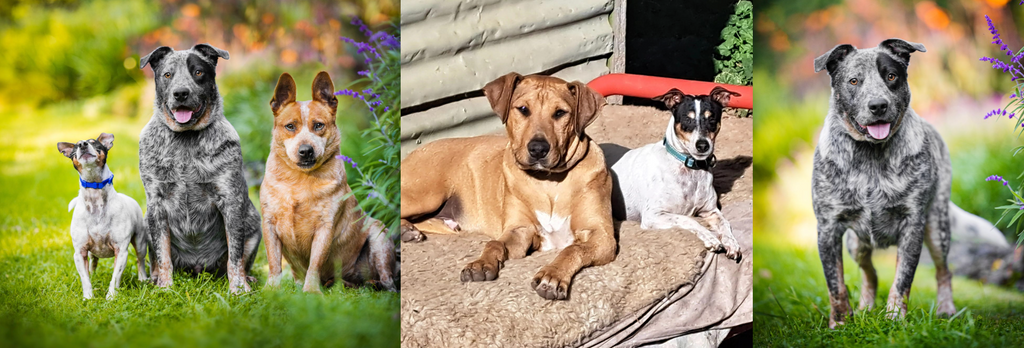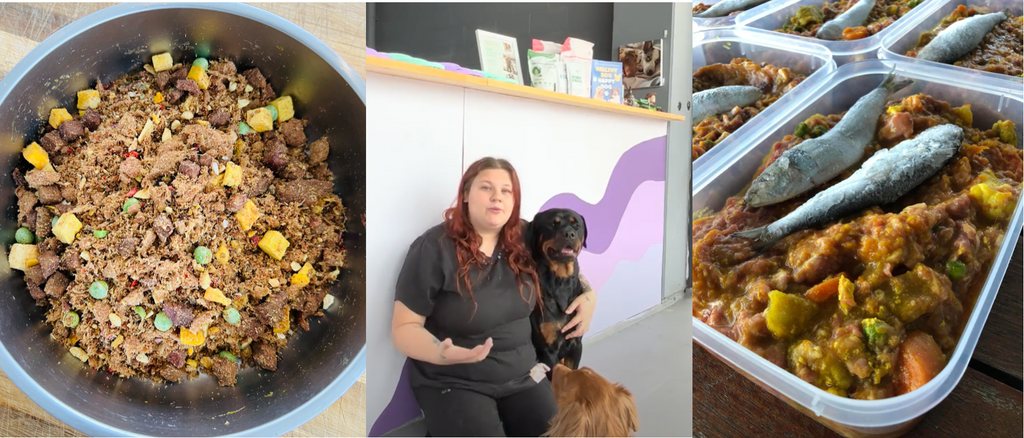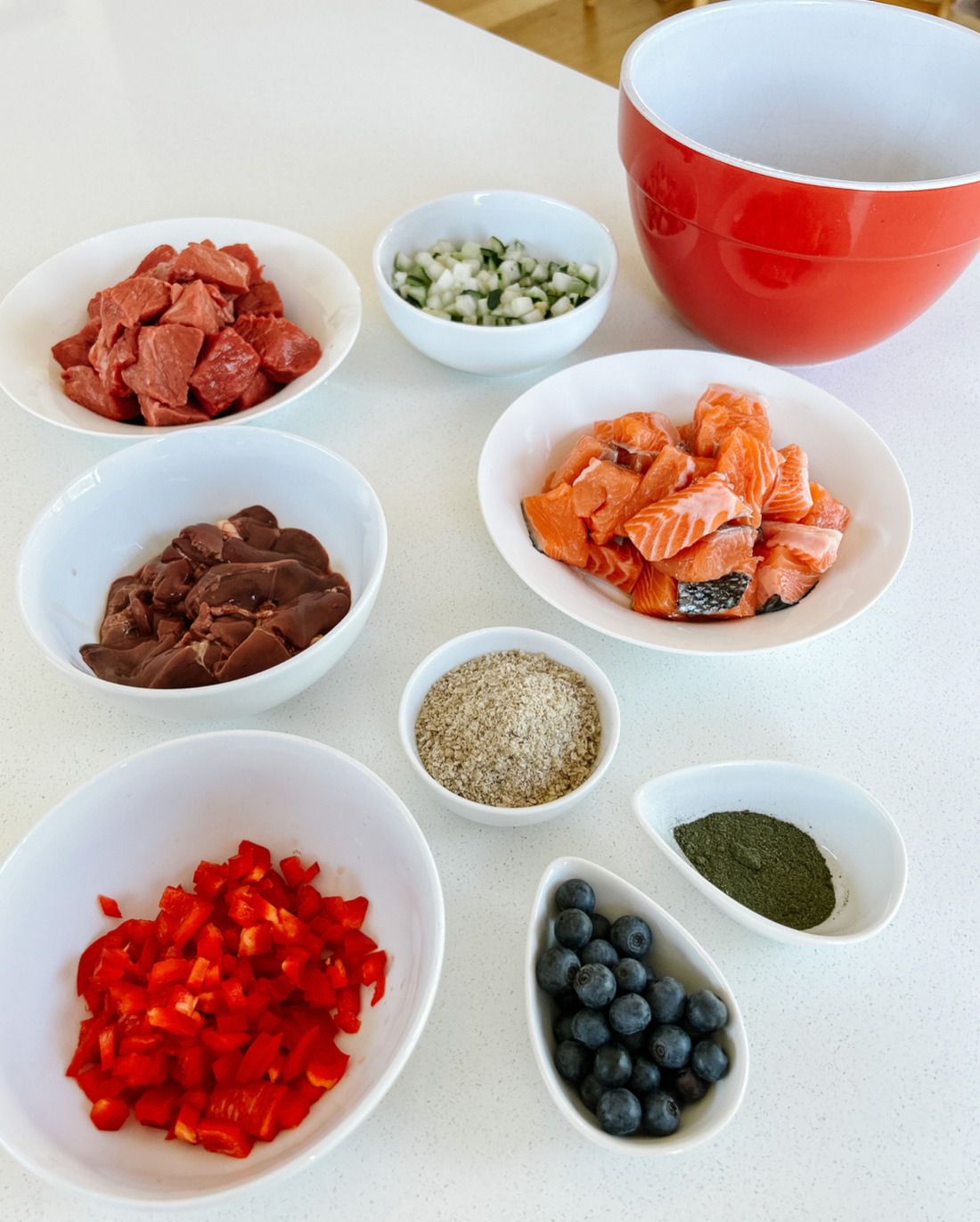
Food substitutions when following a raw or home made meal plan
Hello everyone!
So, at Healthy Active Pet, we have a heap of meal plans and recipes for cats and dogs to use.

And other than getting lots of feedback about their dogs and cats loving the food - one of the most common questions our team has been getting is what do customers do if they can't get certain foods on their shop.

So we asked out pet nutritionist to create a a food substitution list to help everyone out - whether you are using our recipes and meal plans or not - so you have a better idea about food substitutions
We hope you find it useful

Protein swaps
You can swap muscle meats if you are unable to source something, but if possible it's preferable to keep within a similar nutritional profile.
For example if you’re unable to find turkey, swap for chicken or another poultry; swap beef for lamb, or venison for kangaroo.
Organ meats and meaty bones are generally included for functional nutritional reasons, so it’s important to retain these ingredients to the extent possible.
We understand some variations are unavoidable, so we have compiled the list below of which substitutions will provide the best nutritional outcome.

Any changes to the recipes may mean that they are no longer perfectly balanced to the AAFCO standards, but this is completely OK (within reason), so long as your pet is eating a wide variety of foods and following the general principles of the recipes as they are written.
- Beef liver: lamb liver (sometimes called lamb’s fry)
- Lamb liver: beef liver
- Chicken liver: any other liver
- Duck liver: any other liver
- Pork liver: any other liver
- Lamb kidney: any other type of kidney or swap for liver or heart
- Beef kidney: any other type of kidney or swap for liver or heart
- Fresh sardines: tinned sardines, salmon, mackerel, pilchards
- Chicken heart: any other heart
- Duck heart: any other heart
- Lamb heart: any other heart
- Beef heart: any other heart
- Duck gizzard: chicken gizzards (sometimes called giblets)
- Chicken gizzards: chicken thigh
- Turkey neck: chicken or duck neck or wings
- Duck neck: chicken or turkey neck, duck or chicken wing
- Eggs: eggs from a different bird, oily fish, cod liver oil
Fruits and Veggies
Ingredients like fresh fruits and vegetables are generally included in the Healthy Active Pet recipes because they offer beneficial compounds like phytonutrients, vitamins and antioxidants, as well as fibre.

However, these compounds are widely available across the rainbow spectrum of plants, so you can fairly freely swap fruits and vegetables for different choices if your pet has a particular preference or if you find something on sale.
If your pet is particularly averse to fruits and vegetables, as some are, you can generally omit these without compromising the nutritional integrity of the recipe.
Other Ingredients
Other compounds in the Healthy Active Pet recipes, such as seeds, powders, herbs and oils, more often than not are included for functional nutritional reasons.
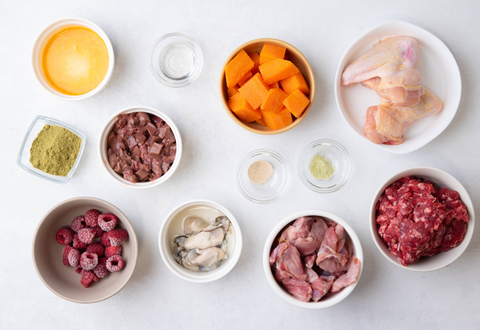
These seemingly minor ingredients often play an important role in ensuring there are no nutritional gaps in your pet’s diet and we encourage you to include them wherever possible.
However, we do understand that can be tricky sometimes, so we have compiled the below list indicating which nutrients are commonly provided by these ingredients, as well as a list of these nutrients and suggestions of alternative sources to provide them.

- Wheatgerm oil: vitamin E
- Cod liver oil: vitamin D, omega 3 DHA+EPA fatty acids
- Sunflower seeds and oil: vitamin E, omega 3 ALA fatty acids
- Hemp seeds and oil: omega 3 ALA fatty acids, vitamin E
- Flaxseeds and oil: omega 3 ALA fatty acids, omega 6 LA fatty acid, vitamin E
- Chia seeds: omega 3 ALA fatty acids, omega 6 LA fatty acid, magnesium
- Pumpkin seeds: omega 6 LA fatty acid, vitamin E, zinc, magnesium, manganese
- Kelp powder: iodine
- Wheatgrass powder: zinc, vitamin E, manganese, copper
- Turmeric, cinnamon, ginger: manganese
- Vitamin E: wheatgrass powder, wheatgerm oil, hemp seeds and oil, sunflower seeds and oil, pumpkin seeds, safflower oil
- Vitamin D: oily fish, cod liver oil, eggs, beef liver
- Zinc: oysters, wheatgrass powder, pumpkin seeds, beef
- Manganese: mussels, oysters, pumpkin seeds, turmeric, cinnamon, ginger
- Magnesium: pumpkin seeds, spinach, chia seeds, almonds, cashews, peanut butter
- Copper: beef and lamb liver, wheatgrass powder, oysters, cashews
- Iodine: seaweeds and sea vegetables, iodised sea salt
- Omega 3 ALA fatty acids: chia seeds, hemp seeds and oil, sunflower seeds and oil, flaxseeds and oil
- Omega 6 LA fatty acid: pumpkin seeds, chia seeds, flaxseeds and oil
- Omega 3 DHA+EPA fatty acids: oily fish, cod liver oil
And if you want to check out our recipes in our popular recipe book here

